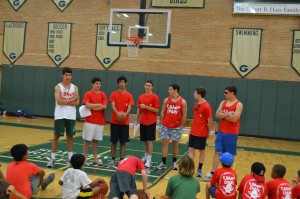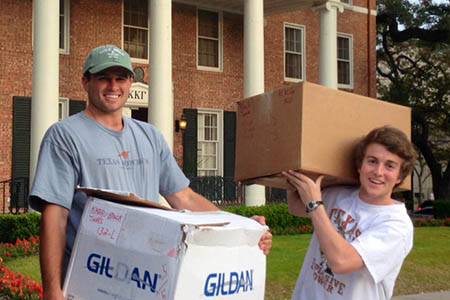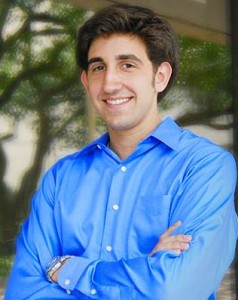 Ryan Lieberman, a freshman in the program, started Camp SPARK, with his brother Blake, in the Summer of 2010. As a freshman in high school, Ryan knew he wanted to gain experience in operating a business. He decided to merge his passions for community service and athletics to create Camp SPARK. The camp has come a long way from the first session held in Ryan’s backyard. It is now available nationwide. Learn more about Camp SPARK and Ryan’s plans for the future as a BHP student.
Ryan Lieberman, a freshman in the program, started Camp SPARK, with his brother Blake, in the Summer of 2010. As a freshman in high school, Ryan knew he wanted to gain experience in operating a business. He decided to merge his passions for community service and athletics to create Camp SPARK. The camp has come a long way from the first session held in Ryan’s backyard. It is now available nationwide. Learn more about Camp SPARK and Ryan’s plans for the future as a BHP student.
What is Camp SPARK?
SPARK stands for Strong Powerful Athletic Rocking Kids. The camp is as much about sportsmanship as it is sports and it helps kids learn social skills in a way that they can easily connect with and understand, through sports and activities. At Camp SPARK, campers play games altered to the camp such as “Extreme Duck, Duck Goose.” Children ages 5–13 can participate in Camp SPARK. It’s a camp run by kids, for kids, because the set-up is unique in that it’s a business opportunity for high school students to start camps for younger kids.
How were you inspired to start the camp?
I’m very much an entrepreneurial-type of person. I love the idea of being my own boss and working for myself. So, the summer after my freshman year of high school I started thinking of ways that I could start my own business to gain experience being my own boss and familiarize myself with the processes involved in building a business.
I’ve always been passionate about community service and have been very active in Big Brothers Big Sisters. The bond I built with my “little” is a big part of what inspired me to reach out to children. I love the idea of directly influencing someone’s life and seeing change happen – knowing you were part of it. As for the idea of a camp, I went to summer camp all my life and just loved it. I knew opening a camp would be fun, something I could do well, and it would lead to a good experience.
The support of my parents was also influential. My dad is my biggest role model and he really encouraged me to do what I love and run the show.

How did you get the camp up and running?
The first summer, my parents were very supportive of what I was trying to accomplish and agreed to sponsor the start-up of Camp SPARK. The camp was run out of my backyard the first year. To get campers, my brother and I called and emailed over a hundred parents from our school directory and got 12 campers to enroll for the week. I didn’t make a lot of money the first summer, however I learned a lot of lessons.
The next summer I was a lot more organized and a much better marketer. I set up a Facebook page and sent out a video link to my email list. I also received a lot of good word of mouth promotion. Participation almost tripled to 35 kids a day. I ran the camp twice as long and profited nearly $13,000. The next year, we created a website and increased marketing. A larger facility became a necessity. I negotiated a deal with my school and relocated the camp. It worked out really well. That’s about the time I realized that I had a reproducible business and that if I could do this, other people could too. I began looking for city partners to initiate Camp SPARK in their area. Not just in Texas, but nationwide. We opened a girls’ camp that summer and our first camp outside of Dallas with my cousin Zach in Austin and they both went really well.
The following year we put an ad on Facebook and everything really took off from there. Over the last four summers we have grown from a backyard camp into a nine-location business in five cities across the country (Dallas, Austin, San Francisco, Boston and Denver). Hundreds of kids are now Camp SPARK campers. We have four boys’ camps, five girls’ camps, six city partners and employ over 60 people. We have an accountant, a lawyer and an insurance agent. We have learned how to create really good systems and how to protect our business and ourselves.
Each camp is tailored to the location. For example, in San Francisco, the surrounding neighborhood has a lot of under-privileged kids, so that camp is corporate sponsored and doesn’t charge campers and places a special emphasis on reinforcing the importance of education. It’s important to know the community and the needs of that community so a difference can be made.
What does the future hold for Camp SPARK?
I hope Camp SPARK continues to be as successful as it has been. Now that I’ve started college, I still want to grow Camp SPARK and keep it as a source of income, but I’m looking for someone to take over my role of overseeing all of the operations. Starting and running the camp has been an amazing experience and now I’m ready to see what my next endeavor will be.
What does the future hold for you?
Running a sports camp has been a lot of fun and a great experience. I plan to start more businesses and hopefully continue with sports-related work, but not necessarily in the camp setting. I know I ultimately want to be my own boss, so any experience I can continue to gain in operating businesses would definitely be of interest to me. My plan is to use what I am learning to pursue my next business ideas and also to help other kids start their own businesses. One of the things I am excited about within the Business Honors program is the people in it. I am going to have great classmates to learn and work with, and hopefully one day start businesses together with.





